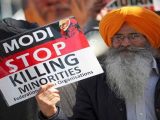
Bangladesh Awami League’s Militant Politics and Crimes Against Humanity
November 8, 2023Bangladesh Awami League (BAL), one of the largest political parties in Bangladesh and the incumbent ruling party, has a troubling history marred by violent political crimes. The special research report by the South Asian Policy Initiative Inc. (SAPI) delves into the extensive record of atrocities committed by the BAL and its affiliated organizations. The report exposes a grim narrative of murder, torture, vandalism, looting, robbery, abduction, gang rape, and targeted attacks on minority groups, all of which fall under the category of crimes against humanity.
The objective of this report is to explore whether these criminal practices have been deeply rooted in the BAL’s ideology since its inception in 1949. Evidence suggests that these criminal activities have persisted over the years, with a significant upsurge in violence during the autocratic rule of Sheikh Mujibur Rahman after Bangladesh gained independence in 1971. During this period, reports describe a society ravaged by fear and violence, forcing rural populations to become refugees due to the actions of party cadres.
Despite achieving sovereignty in 1971, Bangladesh’s potential as a developing country remains untapped, primarily due to the violent and unlawful interventions of the BAL. The report highlights how these activities hinder the establishment of the rule of law and functional democratic institutions. Currently, Bangladesh faces a surge in violence, criminal activities, and human rights violations, often involving individuals associated with the ruling party, the BAL, and its affiliates. This report serves as a clarion call to address these pressing issues and provides guidance on effective measures to restore accountability and foster positive change.
The report also investigates the direct involvement of affiliated organizations, individual leaders, and policymakers associated with the BAL in Bangladesh, examining their potential engagement in crimes against humanity. Notably, the period from 2009 to 2023, under the rule of Sheikh Hasina, has been particularly brutal in the country’s recent history. It’s essential to clarify that the scope of this study does not cover the atrocities committed by state apparatus while the BAL has been in power. Instead, it primarily focuses on the crimes against humanity perpetrated by the BAL as a political parties
The report unveils the involvement of BAL members in attacks on ethnic and religious minority communities in Bangladesh. These attacks are often motivated by financial gains or a deliberate agenda to seize the properties of the targeted individuals or communities. This widespread violence occurs within a pervasive culture of impunity, where members of the party and its affiliates evade accountability and deny access to justice. This alarming situation takes place against the backdrop of a shift towards one-party rule, which undermines democratic institutions and principles in the country.
While this study draws upon credible reports from reputable media outlets and primary sources, it is essential to note that the absence of press freedom in Bangladesh may have resulted in many incidents going unreported. The 2023 media freedom report of Reporters Without Borders highlights the concerning state of press freedom in Bangladesh, ranking it at the lowest position in South Asia. This limitation on media independence could have hindered the full extent of information available for this study.
The SAPI research report sheds light on the distressing history of violent political crimes committed by the Bangladesh Awami League and its affiliated organizations. These acts, categorized as crimes against humanity, have had a detrimental impact on the nation’s progress and democratic institutions. The report calls for international attention and action to address these issues, restore accountability, and uphold the principles of justice and democracy in Bangladesh. It is imperative that such grave violations are not ignored, and measures are taken to prevent their recurrence in the future.
